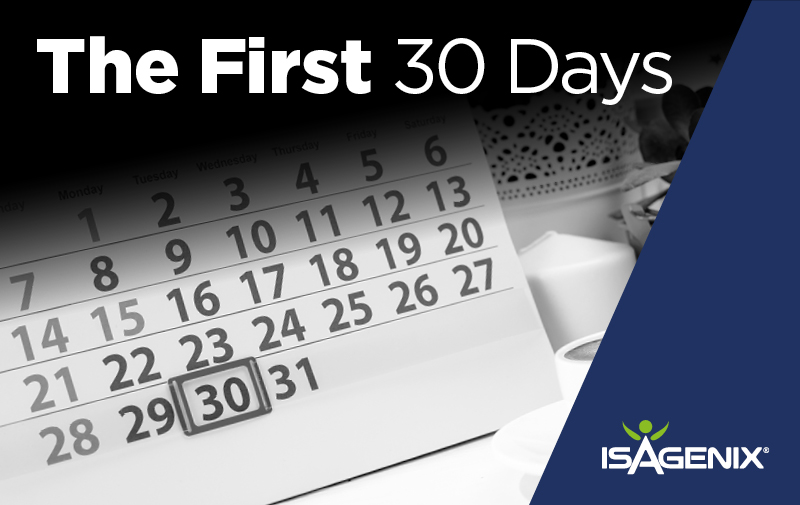Switching to a Healthy Lifestyle: What to Expect in the First 30 days
February 7, 2018,
Rebecca Haresign

So, you’ve made the decision to adopt a healthy lifestyle, change your eating habits, and get moving. It may seem simple at first, but the reality is that most people need to give their bodies a chance to gradually adjust to these healthy changes.
Below are some of the most common challenges people report when making significant changes to their eating and lifestyle habits, along with some advice on how to manage them.
Controlling appetite
It’s not uncommon to feel hungry when reducing your overall calorie intake. However, be careful to not reduce your calorie intake by too much in the first 30 days. Although we recommend using our System Guides as a starting point, we’re all different and some people may need to begin with consuming more regular or higher-calorie snacks than others. Many people don’t realise they’re making such a drastic reduction in calories, and the resulting hunger can come as a shock.
For a person to become overweight, they’re likely to have been consuming more calories (energy) than their body requires for a prolonged period. Switching to an Isagenix Weight Loss System can result in a significant decrease in calorie intake – for some people this could be as much as a 50% decrease in calories each day. It’s no surprise that this can lead to feelings of hunger! To lose between 0.5 and 1.0kg per week, you’ll need to eat 500-600 fewer calories per day, so this will depend on what a person’s diet was like before they started using Isagenix products and systems.
Maintaining energy levels
Just like hunger, the issue of decreased energy typically comes from sudden or drastic changes in calorie intakes. It’s also common to feel low on energy if you don’t choose nutrient-dense foods to consume alongside Isagenix products. When you combine a sudden increase in physical activity with a large reduction in calories, feelings of low energy can be intensified.
To avoid feeling tired or run down, it’s best to gradually reduce your calorie intake and slowly increase your physical activity, rather than making several sudden changes all at once. Although deciding to have a healthier diet and lifestyle should result in increased energy levels over time, most people need to give their bodies a chance to adjust to changes gradually.
Avoiding occasional headaches
Headaches can be common when making changes to your diet, and can be caused by anything from decreasing the amount of carbohydrate you consume or forgetting to stay well hydrated. Adding in a few extra snacks when first getting started on your 30 Day Weight Loss System can help your body gradually adjust to the nutrients provided in your diet and reduce your changes of experiencing unwanted symptoms.
We recommend starting slowly: gradually reducing your calorie intake on your Shake Days, and waiting until you can easily complete Shake Days before attempting a Cleanse Day*. Consider starting with a shorter ‘mini-cleanse’ of 12-16 hours, or add in extra snacks on your first few Cleanse Days* to break yourself in gently. By taking a gradual approach, you can build your confidence and find the Cleanse Day* routine that works best for you.
If you’re also starting a new exercise programme at the same time, it’s important to remember to include enough drinks to replace fluid and salts lost through your sweat. A sports drink that includes electrolytes, such as AMPEDTM Hydrate, will help keep you hydrated. The small addition of carbohydrate in this drink can also help to keep your blood sugar stable throughout your workout, which can help to keep headaches at bay.
Adjusting to digestive changes
When making significant changes to your diet, it’s common to experience changes in your digestion. Luckily there are measures you can take to help ease your body’s adjustment to your new, healthy dietary choices.
When switching to a healthier diet, it typically means increasing dietary fibre and nutrient-rich foods. Increasing fibre intake too quickly is often the reason many people experience digestive issues when changing their diet, so try increasing your fibre intake in stages and mixing up your diet to include different sources of fibre.
Additionally, make sure you’re drinking enough water. Staying hydrated is particularly important for those struggling with constipation; when the body is dehydrated, so is the digestive tract. Water helps to keep digestion flowing, and without enough water digestion can come to an uncomfortable halt. To make sure your digestive tract is getting the fluid it needs, try to consume at least 2-2.5 litres of water throughout the day.
Transitioning smoothly
Your journey to good health should be a pleasant experience. Although some people may experience mild discomforts when they’re first making changes to their lifestyle, felling unwell should always be a sign to slow down. You might be making too many changes too quickly for your body to adjust. As always, we recommend to consult your doctor before making significant changes to your diet or if you are concerned about the symptoms you experience. By preparing, knowing what to expect, and how to deal with it, you’re more likely to be successful in your transition to a healthy lifestyle.
* A Cleanse Day is a nutritionally supported fast that nourishes and energizes your body’s own detoxification systems. For further Cleanse Day information, visit Isagenix.com.
Reference
European Food Safety Authority. Scientific opinion on dietary reference values for water. EFSA J 2011;8:1459-1506




